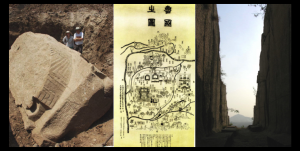Presented By: Confucius Institute at the University of Michigan
Chinese–Greek Comparisons in Archaeology and Popular Culture

"Archaeology and Popular Culture in the Confucian Landscapes"
Talk by LI MIN (PhD '08), Assistant Professor, Department of
Anthropology, and Department of Asian Languages and Cultures, UCLA
Archaeology and popular culture often intersect through tourism. By visiting ruins and historical landscapes, the past was experienced and imagined by the visitors. Since early imperial China, visiting the places where Confucius and his disciples lived constituted an important cultural activity of understanding the classical world. With the current revival of traditional cultures in China, journeys through the Confucian landscape once again became important means of embracing the classical tradition. With the development of site parks, museums, performances around the Bronze Age city site, a vibrant popular culture of classical tourism emerged with archeology/ancient world as backdrops. What does archaeology have to contribute to this creation and recreation of cultural experience centered around the Confucian classics? The archaeological inquiry not only illustrates the past through material culture to enrich the popular imagination of the classical world, but also reveals hidden narratives left out by the idealized representation of the past in classical tourism.
"Hellas Essentialized: The Gr€€k Economic Crisis, Political Cartoons, and Classical Greece"
Talk by LAUREN TALALAY, Curator of Education, U-M Kelsey Museum
While the study and interrogation of modern Greek identity has taken many forms over the years, one subject that invariably surfaces in these discussions is the deployment of Greece’s antiquity in framing that identity. As many scholars have noted, images from Classical archaeology and mythology are omnipresent in modern Greek culture; they comprise a major part of its symbolic and cultural capital. This talk provides a case study of one aspect of that symbolic capital, exploring how the Western press has drawn from Greek images and associated ideas of antiquity and manipulated them in political
cartoons to provide a view of Greece’s current failure in the world marketplace. Political cartoons, sometimes referred to as the “art of ill will,” provide an ideal laboratory for exploring the stable of images that political satirists believe effectively summarize a culture’s heritage, identity, or what might be deemed its “essence” for a popular audience.
Talk by LI MIN (PhD '08), Assistant Professor, Department of
Anthropology, and Department of Asian Languages and Cultures, UCLA
Archaeology and popular culture often intersect through tourism. By visiting ruins and historical landscapes, the past was experienced and imagined by the visitors. Since early imperial China, visiting the places where Confucius and his disciples lived constituted an important cultural activity of understanding the classical world. With the current revival of traditional cultures in China, journeys through the Confucian landscape once again became important means of embracing the classical tradition. With the development of site parks, museums, performances around the Bronze Age city site, a vibrant popular culture of classical tourism emerged with archeology/ancient world as backdrops. What does archaeology have to contribute to this creation and recreation of cultural experience centered around the Confucian classics? The archaeological inquiry not only illustrates the past through material culture to enrich the popular imagination of the classical world, but also reveals hidden narratives left out by the idealized representation of the past in classical tourism.
"Hellas Essentialized: The Gr€€k Economic Crisis, Political Cartoons, and Classical Greece"
Talk by LAUREN TALALAY, Curator of Education, U-M Kelsey Museum
While the study and interrogation of modern Greek identity has taken many forms over the years, one subject that invariably surfaces in these discussions is the deployment of Greece’s antiquity in framing that identity. As many scholars have noted, images from Classical archaeology and mythology are omnipresent in modern Greek culture; they comprise a major part of its symbolic and cultural capital. This talk provides a case study of one aspect of that symbolic capital, exploring how the Western press has drawn from Greek images and associated ideas of antiquity and manipulated them in political
cartoons to provide a view of Greece’s current failure in the world marketplace. Political cartoons, sometimes referred to as the “art of ill will,” provide an ideal laboratory for exploring the stable of images that political satirists believe effectively summarize a culture’s heritage, identity, or what might be deemed its “essence” for a popular audience.
Explore Similar Events
-
Loading Similar Events...
